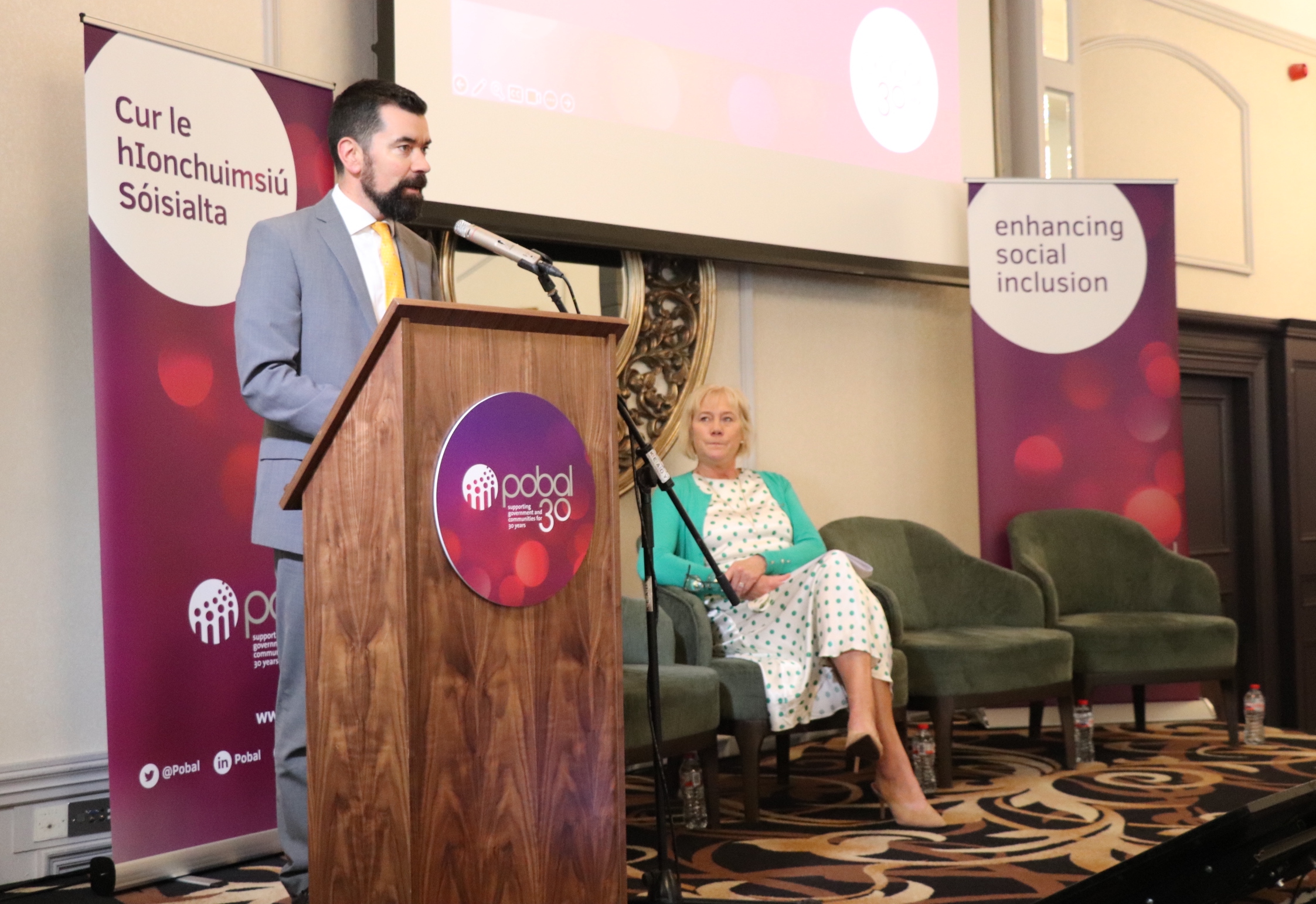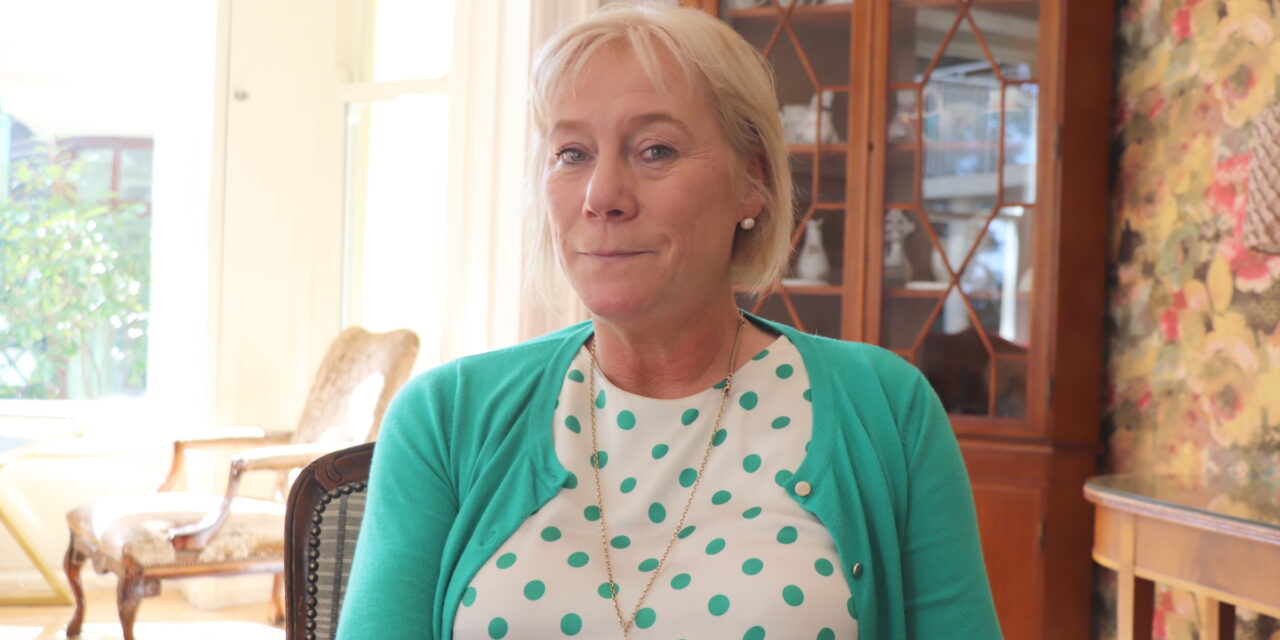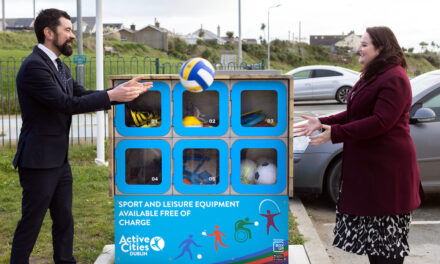Pobal is celebrating 30 years in operation this year. It has expanded rapidly and now has over 700 staff in 12 office locations around the country. In 2022, it distributed €901m on behalf of government departments to thousands of community groups.
It’s CEO, Anna Shakespeare, is clear, however, that the agency’s 30th anniversary celebrations are not about Pobal as such, but about the communities they serve.
Anna can empathise with managers, workers and volunteers in community groups because she’s been there. Before becoming CEO of Pobal, in 2019, she worked for 35 years in disability social care services, the last five of which were with St. Michael’s House, a community-based organisation delivering services and supports to people with an intellectual disability. She is also a qualified nurse.
“In celebrating Pobal’s 30th anniversary, we have focused on the work on the ground by people delivering SICAP, engaging in community development, delivering early learning and care services, creating spaces in the community, creating interventions and activities in the community,” she said. “Our role is in supporting that. The people on the ground are the ones who deliver. They’re the real heroes. From the outset, I was clear it wasn’t about Pobal, it’s about the tens of thousands of providers – local community groups who do the work.
“Pobal is simply a bridge to the funding out there on behalf of government. That’s why ‘Enhancing Social Inclusion in 2023’ is our theme for this year.”
Asked what she has most enjoyed so far this year, she said, “It’s the energy that you feel from the community and voluntary organisations, that genuine feeling you get of a vibrant sector.”
Pobal’s slogan “Supporting government and communities” also neatly sums up what it does. As Anna said, it is engaged in supporting government and other agencies in the implementation, administration, management, evaluation and data and analytics of 41 programmes, on behalf of seven government departments and the Special EU Programmes Body, and the Probation Service.

– Panellists at Pobal’s 30th Anniversary event held on September 6 in Galway. Anna Shakespeare, CEO, Pobal (left); Kensika Monshengwo from the Immigrant Council of Ireland; Dr Rita Melia, a lecturer in early childhood education and care; and Martin Ward, co-ordinator of Galway Traveller Movement. Photos by A. Meagher.
EXEMPTION FROM EU RULES
As Anna explained in a recent Carmichael podcast (worth a listen) Pobal is not involved in policy: “That’s not our role. What we do is we use the data we capture to inform government policy development, to demonstrate to them what’s working, what’s not.”
Pobal, originally called Area Development Management, has what is called a Teckal exemption which means it is exempt from the usual EU procurement rules.
“It’s transposed into Article 12 of the EU directive. If the government wants to use us, they don’t have to procure us.
“We’re not set up for financial gain. All we need to do is wash our face, cover our costs and where we can, from our management fee only, put some money in our reserves,” she said.
NOT EXACTLY DELIGHT AND JOY
Pobal was originally set up to act as an intermediary for the EU to provide certainty about how funding to the Irish government was spent. Corruption across the EU is an issue and keeping an eye on money trails is critically important. Pobal has an excellent reputation in this regard, but it can wear people out at grassroots level.
In a speech that morning, Minister of State Joe O’Brien opened by looking back on his years in the community sector, when he worked in organisations “where, when the word Pobal was mentioned, it’s not that everyone exactly reacted with delight and joy”.
Nonetheless, the minister had travelled from Dublin to Galway that day with the sole purpose of thanking Pobal and paying tribute, because, as he said, “They’re really one of the most important organisations the government co-operates with when we’re trying to tackle social exclusion.”
“The work of Pobal often goes unsung and it’s sometimes misunderstood as well. Pobal helps government and society to achieve what we want to achieve in terms of social inclusion and I’ve seen first-hand the impact of the numerous programmes that Pobal has helped to design, implement and oversee over the past 30 years,” said the minister.
Anna said afterwards: “If you’re going to pull down a lot of money, there has to be an audit trail. It’s not popular, what can I say, but it’s necessary.”
“We want to simplify the application, audit and reporting requirements,” she added.
NATIONAL FUNDING PLATFORM
On the grand scale, she hopes to one day see Ireland have a one-stop-shop for funding whereby groups would only have to input their core data once.
“It would be a single place on gov.ie. You would apply online, put your governance information in once, and then whenever you log in, up pop the grants you are eligible for and the live grants you have. You input any new data and an engine at the back would pull the data out and provide it to the people looking for reports in particular formats.
“It’s more than an ambition at this stage. With the Department of Rural and Community Development we’ve met with other government departments and the concept is developing traction. It was discussed at PAC,” she said.
However, a national funding platform won’t happen quickly. She said that it will require government and organisations to agree on definitions. For example, what’s a NEET? (the term to describe a young person who is “Not in Education, Employment, or Training). What’s a young person? Is the age bracket for a NEET 15-24, or 15-25. What’s a liquidity ratio? And so on.

– Minister Joe O’Brien speaking in Galway recently as Anna Shakespeare looks on during one of Pobal’s 30th Anniversary events.
COMMUNITY DEVELOPMENT
Anna believes that community development has become more visible in recent years.
“Because of our experience of Covid-19 we have a better societal understanding of what community development looks like – it’s centrality, its importance, the fact that it is the community being empowered to work together and pull together,” she said.
She would like to see all the recommendations in the Catherine Day report (worth a google) implemented.
Much community development work in Ireland is carried out with support from the Social Inclusion and Community Activation Programme (SICAP). The programme continually exceeds its targets and proved critical in supporting communities through Covid and the arrival of refugees from Ukraine and elsewhere. It supports 13 socially excluded target groups and communities. With needs growing, I asked why SICAP’s budget has not been doubled or tripled.
“It’s €241m over six years. That’s not small, it’s huge money, and it’s partly European funded,” she said.
Low salaries in the Community and Voluntary Sector is an issue that goes beyond the level of pay, says Anna: “It’s a social inclusion issue, a gendered issue, an equality issue, as well as a retention and recruitment issue. In the Early Years Sector, 98% of the staff are women and they’re supporting the families of Ireland and earning the least amount of money. In fairness to the Department of Children, they do recognise that and the government is taking action.”
Not all countries have a government department for community development.
“I absolutely think it’s important to have a dedicated department for community development,” said Anna. She paid tribute to the Department of Rural and Community Development. It deserves credit, for instance, for advancing “really strong policies”, including re-imagining social enterprise policy.
While collaboration is one of the UN’s 17 Sustainable Development Goals, Anna acknowledges that people are not resourced enough or given enough time to collaborate. However, networking and collaboration help nurture good relations: “If you have a solid, trusted, credible relationship with the people, providers and organisations – and remind yourselves of the things you have in common rather than the things you’re unhappy with each other about – you’re more likely to be successful together,” she said.
NEW EARLY YEARS AGENCY
A new agency for supporting Early Learning and Care and School Age Childcare is promised by government.
Anna says it is as yet unclear what the new agency will look like, but Pobal will support it, regardless of the challenges it might bring for Pobal.
“The Department of Children commissioned a report, published two years ago which sets out the options for the future. There’s a programme board now in place and it is commissioning research to see what the functions of a new agency would be. The agency will be established under statute.
“It has the potential to create challenges for Pobal, but we are not a barrier to its creation. Its purpose will be to rationalise and streamline the system which is fractured. But it is as yet unclear how all the functions currently delivered through independent companies, such as city and county childcare committees, national childcare organisations and Pobal will be brought together within this new agency.”
FEEDBACK TAKEN SERIOUSLY
Pobal strives to respond positively to feedback on improving its bureaucracy. I gave an example involving a complaint by a community group over an arduous, online, funding application process, narrow deadlines and the burden the digital element places on volunteers.
Anna replied at length, saying Pobal takes feedback seriously and she sought more information to be able to address the issue raised.
“We are always trying to improve,” she said. Where helpful, Pobal staff will meet voluntary chairs and project managers to learn how to improve the service.
NATIONAL CONFERENCE
Pobal is celebrating its 30th anniversary by highlighting progress made in the last three decades towards social inclusion, equality and community development. It held regional events in Monaghan, Galway and Cork in the lead up to its national conference scheduled for November 2, in Dublin.
The agency is also planning a separate event to bring its 700-plus staff together for the first time. “We never normally get together. We will for this unique occasion. Katriona O’Sullivan will be one of the speakers,” said Anna.
If Irish stew is on the menu, don’t be surprised!





